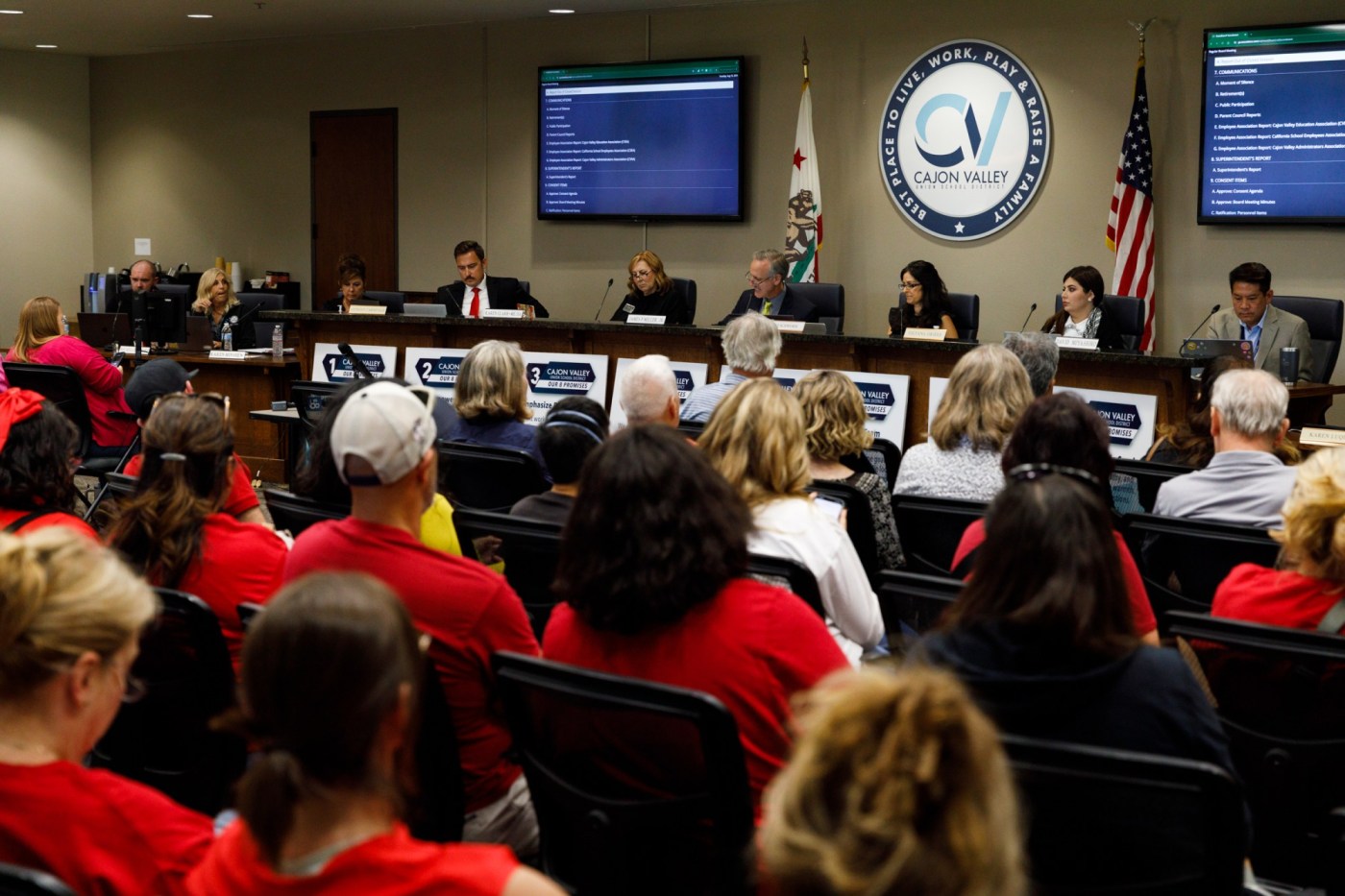East County’s Cajon Valley Union School District is the latest addition to a small but growing crowd of districts moving to require employees to inform parents of possible changes in their children’s gender identity — a decision that appears to defy a new California state law.
Related Articles
First new public high school in Alameda County in more than 50 years opens
Judge approves six-figure settlement in case of California special-needs student’s broken arm
South Bay high school football team victim of costly weekend heist
South Bay 16-year-olds turn old clothes into new dog toys
Newsom urges schools statewide to restrict smartphone use
At their first meeting of the school year Tuesday, all five board members voted unanimously to expand what they call the bill of rights for parents of children in the district.
One addition delineates parents’ right to review school curricula. Another lets parents challenge books in school libraries.
But such elements only seemed secondary to the long queue of attendees waiting to comment on the proposal.
At the heart of the effort is the stipulation that school administrators must inform parents should students under 12 change their gender presentation or identity, for instance by asking to be called by a different name or pronouns or to use different restrooms.
“Think about how many students in a K-8 district this protects,” said Jim Miller, the board president, who started drafting the resolution about nine months ago. “Why would we not protect them by having the parents who raised them be involved?”
The policy would create an exception for when school officials believe a student risks abuse or other harm if their parents are informed.
Opponents, including parents, teacher unions and LGBTQ+ advocates, say the policy would inhibit students’ chances to safely explore their gender identity and lead to what they call forced outing.
Steve Davidson, president of the Cajon Valley Education Association, speaks on a resolution that would call for a parental notification policy during a board meeting at the Cajon Valley Union School District headquarters in El Cajon on Tuesday, Aug. 13, 2024.
“Children have the right to come out to us and to anyone when they are ready to do so,” said Terrie Vorono, the past president of PFLAG San Diego County, a nationwide support group for LGBTQ+ families. “It’s their responsibility, their right, their privilege to share information with those they choose to share it with.”
Last month, California Gov. Gavin Newsom signed legislation proposed by San Diego Assemblymember Chris Ward that prevents school districts from enacting any policies that require employees to disclose a student’s sexual orientation or gender identity without their consent. That law will invalidate any existing school policies once it takes effect Jan. 1.
In a statement, Ward said the law “prevents school districts from requiring educators to forcibly out students” and helps cement previous district guidelines.
The law will also protect teachers who don’t enforce those gender notification policies, Ward added.
This comes as more Californian school districts emerge as battlegrounds over gender identity and privacy.
In May, the Lakeside Unified School District passed its own parental bill of rights to notify parents of district actions related to what it calls “sexual transitioning.”
Andrew Hayes, who chairs the Lakeside board and is running for state Assembly, says the district is still implementing its plan but is also looking to join two teachers’ ongoing lawsuit challenging Escondido Union School District’s policy barring them from notifying parents. A federal judge has temporarily blocked the Escondido policy.
“We’re looking at every option so that we’re not violating the law and protecting the district, but also asking the right questions,” Hayes told the Union-Tribune. “Our parents are very concerned about that (law).”
Multiple people addressed the school board about a controversial resolution that would call for a parental notification policy during a meeting at the Cajon Valley Union School District headquarters in El Cajon on Tuesday, Aug. 13, 2024.
The issue is already playing out in courts around Southern California.
Last year, California Attorney General Rob Bonta sued Chino Valley Unified District over a policy requiring school staff to tell parents about changes in their child’s gender presentation, saying it infringed on students’ rights to privacy and protections from discrimination. A judge temporarily blocked the policy while the lawsuit is pending.
During Tuesday’s meeting in Cajon Valley, many opponents also voiced their concerns about potential litigation over the district’s new policy, and the potential costs to taxpayers and their children’s education.
“I agree that parents have the right to know so much,” said Dennis Nicely, co-chair of GLSEN San Diego. “But there are also rights students have by law.”
Asked about the potential for litigation, Miller said he took the new state legislation and existing litigation into consideration in creating the district’s new policy, which he said differs in some key ways he thinks could shield it from challenges. For example, the district’s policy applies to administrators, not teachers or classified staff, and focuses on children under 12.
He also said that the law leaves leeway for people’s interpretation of such notification policies, and suggested the district might adjust its policy if needed to comply with the law should it take effect as planned in January.
Superintendent David Miyashiro declined to say whether he supported the resolution.
Superintendent David Miyashiro at the Cajon Valley Union School District headquarters in El Cajon on Tuesday, Aug. 13, 2024.
Tuesday’s resolution is not the only potential legal battle Cajon Valley has waded into with its policies on LGBTQ+ issues.
Last month, a state department investigation found that the district’s sexual health curriculum discriminates against LGBTQ+ people by leaving out legally required core instructions about LGBTQ+ and gender topics.
The state has required the district to present specific evidence by Jan. 1 that its curriculum contains the required components.
And last year, the district abandoned its contract for student mental health services over a board member’s objection to the nonprofit’s separate services for LGBTQ+ youth overall in the county.












